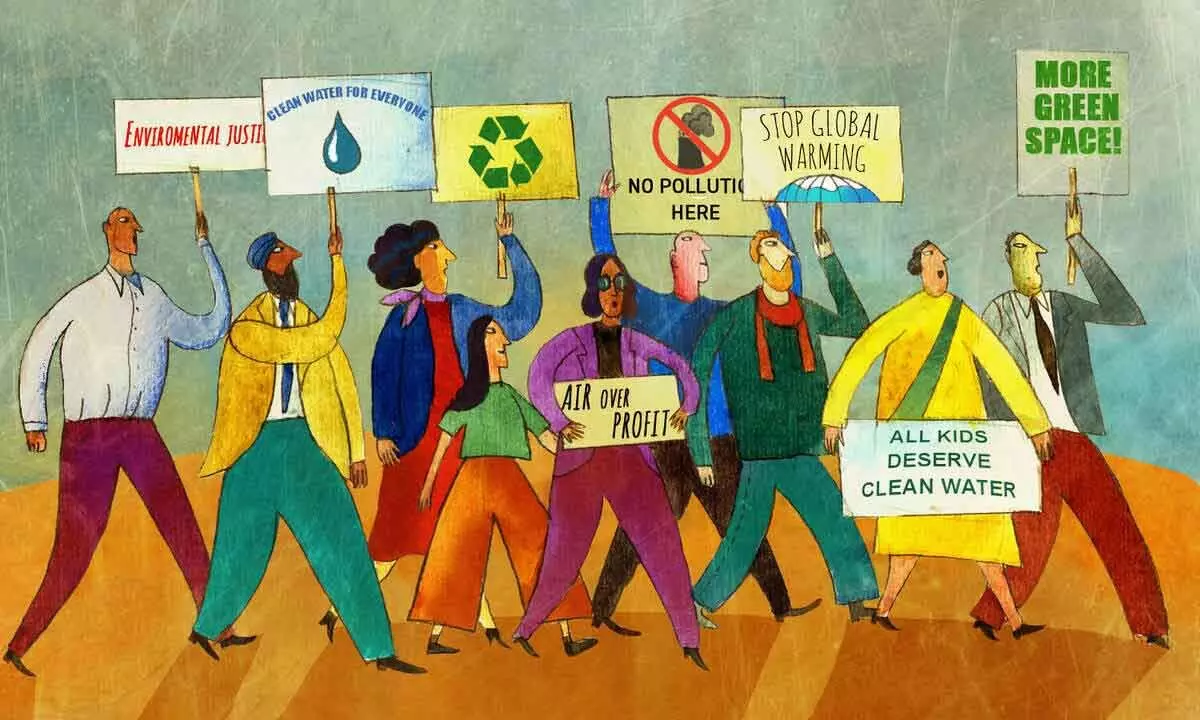Wage movements for environmental justice

The globe seems to be holding its breath, waiting to see how much worse things will turn. National Oceanic and Atmospheric Administration (NOAA), US, has published that global carbon dioxide levels touched a record high in the year just gone. They are more than 50 per cent above those found in the pre-industrial era. There are also record high levels of another greenhouse gas: Methane. It is more potent than CO2 at trapping heat in the atmosphere.
It is quite disconcerting to the concerned people the happenings are not alarming the humans as much as it should. The period April 2023 through March 2024 emerged the warmest 12-month stretch on record with a global average temperature 1.58 degrees Celsius or 2.84 degrees Fahrenheit above the 1850 to 1900 pre-industrial average.
Why should we care? Look around, record breaking temperatures are searing the life on the planet, melting Arctic ice caps and glaciers. Plant life is under severe stress and animals are straying into human habitations for food and water. Already, the poor people are hurting the most across the continents. Just in three decades - by 2050 - World Economic Forum predicts unchecked climate change might force intra-country migration of more than 200 million people, pushing up to 130 million people into poverty, and unravelling decades of hard-won development achievements. Rural India is taking a big hit, with irrigation and drinking water sources drying up. Rural incomes are hit and food inflation has persisting for months with no pause in sight.
Even with general elections upon us - 2024 is an election year in almost 64 countries - adverse climate conditions are yet to figure in public discussions and debates and campaigning by political parties.
We shall be grateful to the courts in democracies to offer a ray of hope, prodding and, even, directing governments to wake up, stop environmental degradation and ramp up climate action.
Europe’s top human rights court - The European Court of Human Rights - ruled on Tuesday that the Swiss government had violated the human rights of its citizens by failing to do enough to combat climate change, in a decision that will set a precedent for future climate lawsuits. It rejected the Swiss government argument that human rights law does not apply to climate change. A group of Swiss women moved the court that they were made vulnerable to heat waves sweeping the nation as the government was not doing enough to mitigate climate change, thus violating people’s rights to life and health. The ruling is likely to spur a spate of litigations by climate groups in respective national courts of the members of the European Union.
Closer home, in India, on March 21, 2024, the Supreme Court held that people have a “right to be free from the adverse effects of climate change”, which should be recognised by Article 14 (Right to Equality) and Article 21 (Right to Health) of the Constitution.
Hopefully, these court rulings in India and abroad will act as a nudge to political parties and governments and more avenues for citizens and civil societies to litigate their environmental concerns in the courts for directions to the governments in the states and at the centre. The court’s recognition of “right against adverse effects of climate change” has set a significant legal precedent and gives scope for strong environmental jurisprudence (laws that protect environment). Hope the people take note of this empowerment and move courts if their elected netas belie their expectations or ignore their well-being.














